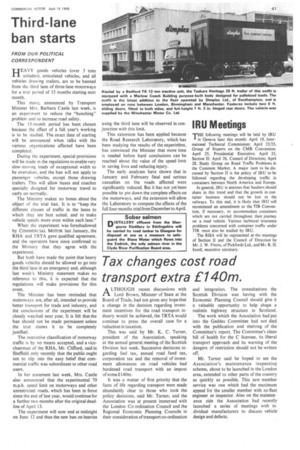Third-lane ban starts
Page 43

If you've noticed an error in this article please click here to report it so we can fix it.
FROM OUR POLITICAL CORRESPONDENT
HEAVY goods vehicles (over 3 tons unladen), articulated vehicles, and all vehicles drawing trailers, are to be banned from the third lane of three-lane motorways for a trial period of 15 months starting next month.
This move, announced by Transport Minister Mrs. Barbara Castle last week, is an experiment to reduce the "bunching" problem and to increase road safety.
The 15-month period has been chosen because the effect of a full year's working is to be studied. The exact date of starting will be announced when talks with the various organizations affected have been completed.
During the experiment, special provisions will be made in the regulations to enable very slow-moving loads of exceptional width to be overtaken, and the ban will not apply to passenger vehicles, except those drawing trailers. This will allow buses and coaches specially designed for motorway travel to carry on normally.
The Ministry makes no bones about the object of the trial ban. It is to "keep the different classes of traffic in the lanes to which they are best suited, and to make vehicle speeds more even within each lane."
When the experiment was foreshadowed by COMMERCIAL MOTOR last January, the RHA and TRTA gave qualified agreement, and the operators have since confirmed to the Ministry that they agree with the experiment.
But both have made the point that heavy goods vehicles should he allowed to go into the third lane in an emergency and, although last week's Ministry statement makes no reference to this, it is expected that the regulations will make provisions for this event.
The Minister has been reminded that motorways are, after all, intended to provide better transport for trade and industry, and the conclusions of the experiment will be closely watched next year. It is felt that the ban should not be made permanent unless , the trial shows it to be completely justified.
The restrictive classification of motorway traffic is by no means accepted, and a vicechairman of the RHA, Mr. Clifford, said in Sheffield only recently that the public ought not to slip into the easy belief that commercial traffic was subordinate to other road users.
In her statement last week, Mrs. Castle also announced that the experimental 70 m.p.h. speed limit on motorways and other unrestricted roads, which has been in force since the end of last year, would continue for a further two months after the original deadline of April 13.
The experiment will now end at midnight on June 12 and thus the new ban on heavies using the third lane will be observed in conjunction with this limit.
This extension has been applied because the Road Research Laboratory, which has been studying the results of the experinient, has convinced the Minister that more time is needed before hard conclusions can be reached about the value of the speed limit in saving lives and reducing injury.
The early analyses have shown that in January and February fatal and serious casualties on the roads affected were significantly reduced. But it has not yet been possible to pin down the complete effects on the motorways, and the extension will allow the Laboratory to compute the effects of the full four-months trial from December to April.








































































































































